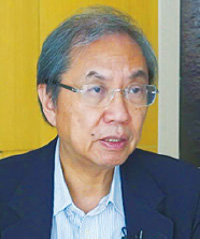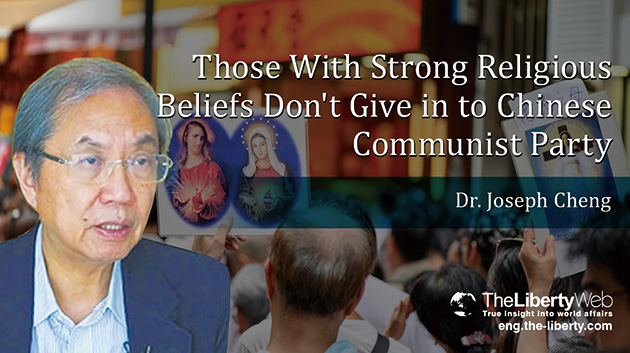Those With Strong Religious Beliefs Don’t Give in to Chinese Communist Party
Joseph Cheng

(Profile) Born in Australia in 1949. A former professor of political science at City University of Hong Kong. He was specialized in Chinese foreign policy, Hong Kong politics and international politics. He was an advisor to the Hong Kong democratization movement.
We directly spoke with Joseph Cheng, Hong Kong democracy activist and former professor at the City University of Hong Kong, regarding religious persecution carried out by the Chinese government.
――Has the enforcement of the Hong Kong National Security Law threatened religious freedom in Hong Kong? If so, could you elaborate on that specifically?
The impact on religious freedom is subtle. There are cases of informal monitoring: i.e., what is preached has been monitored. The United Front Work Department has stepped up; those who are not accepted by Beijing find it very difficult to secure important positions. Many of the social welfare, educational and medical programs are funded by the government. Most rich donors are conservative and are influenced by Beijing. The formal leaders of the churches therefore do not want to confront the Chinese authorities. The Vatican wants to negotiate with Beijing; this compromising attitude has been criticized, especially by retired Cardinal Joseph Zen.
――In your interview last year, you told us that “many Catholics were supporting the democratic movement.” Would you tell us what the believers should do now?
Catholics, like other members of the pro-democracy movement, don’t have many options. The most important thing that they should do is not to surrender and yield to the demands of the Chinese authorities. They should continue to use peaceful and legal means to express their demands.
They understand that they can’t achieve concrete results in the near future. But they should demonstrate the courage and perseverance to continue their non-violent political struggles. Solidarity will help maintain morale, and they should be proud of maintaining their dignity and their willingness to suffer through difficulties and inconvenience.
――In China, the state, or the government, has greater power than churches. However, in democratic countries, churches have a higher authority than secular institutions such as government. What are your thoughts of China’s views on state and church?
Chinese Communists are atheists. They don’t accept genuine religious freedom. They see religions as a threat to the Chinese Communist regime. They want to control all churches to ensure that they do not pose a threat to the regime’s monopoly of power. People who have strong religious beliefs will not completely bow to the Chinese Communist regime. This assessment explains the repressive policies in Tibet and Xinjiang.
Chinese leaders may show some tolerance for religious freedom, but this is only temporary and tactical. They would eventually demand control to maintain regime order.
――In China, even the contents of the Bible were distorted to the extent that Mary Magdalen was stoned by Jesus Christ. Sinicization of Christianity has been going on for a long time, but this level of sinicization is a decisive break from the past wrongdoing and would be a serious blow to Christians in China since their innermost beliefs would be hurt. What are your thoughts on this?
The HK government is now trying to influence the contents of religious education in religious schools. There is less and less tolerance. It is being taught that Jesus Christ loves the Chinese. Attempts are made to control textbooks. Teachers are now afraid to criticize China and the HK government, because then they would lose their jobs.
The worst part is the encouragement of a surveillance culture, where everyone feels unsafe and monitored. At the moment, the emphasis is on patriotism, and religious education and the Bible are not yet the focus. This also explains why families with younger children are more eager to emigrate.
――I feel that China does not care if it suppresses its citizens, including those in Hong Kong, because its beliefs are based on the atheism and materialism of communism. What are your thoughts on this point?
The first priority of the Chinese Communist regime is its survival, and then the maintenance of its monopoly of power. Since HK is now seen as a threat with the younger generation not accepting the regime and even wanting HK to become independent, there is suppression without much tolerance.
Chinese Communists do not believe in individual rights. Instead, all citizens have to serve the Party and the state. More importantly, Xi Jinping believes that China needs HK, and HK has also become dependent on China. China now wants Shenzhen to replace HK and HK to be absorbed as part of the Pearl River Delta.
――Secretary Pompeo’s visit to the Vatican was cancelled when he was trying to stop the renewal of the agreement that was made between the Vatican and the Chinese government two years ago. He appears to want the Holy See to exert His moral authority and duty to protect religious liberty as John Paul II had been doing during the Cold War period. What was your opinion of the Vatican’s cancellation of this meeting with Secretary Pompeo?
The Vatican does not want to antagonize China. Since it had no intention to accept Pompeo’s position, it might as well cancel the meeting. The Vatican wants to be able to spread the gospel in China; it believes Catholicism will prevail in the long term as long as they can convert the Chinese. But making concessions to Beijing will discredit the Vatican and disappoint those Catholics in China who have been holding on to their faith. I think the Pope is wrong. The Vatican should stand firm and thus maintain its appeal in the long term.
――As Secretary Pompeo has hosted the Ministerial to Advance Religious Freedom in Washington, the Secretary of State keeps advocating for religious liberty. How do you see this approach of the Trump administration? Also, how can Japan contribute to religious liberty in Hong Kong and the world?
The Trump administration and the American people now understand that China is a threat and are willing to pay the price to contain this threat. Fighting for religious freedom is part of the strategy to contain the China threat. It has both a domestic and international appeal. It will also help strengthen America’s global leadership.
Japan should follow this lead. Obviously, more and more Japanese see China as a threat too. The way to contain this threat is to uphold universal values. Japan should champion freedom and democracy in Asia. This is the best way to enhance its status and influence in the region. And this is in line with Japan’s values and its goal of contributing to the international community, especially the Asia Pacific region.



















